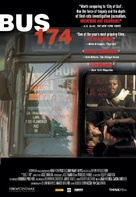Reviews provided by RottenTomatoes
Rene Rodriguez, Miami Herald: This smart, absorbing movie, which has been sharply edited by Felipe Lacerda, never feels like it's spreading itself too thin. Read more
Michael Wilmington, Chicago Tribune: Here is a model example of how TV footage and documentary interviews can both reconstruct an event and help us understand it. Read more
A.O. Scott, New York Times: A deceptively straightforward film that has the force of tragedy and the depth of first-rate investigative journalism. Read more
Patrick Z. McGavin, Chicago Reader: Padilha allows neither easy answers nor ironic commentary, producing on both sides of the conflict a world of inconsolable grief. Read more
Mary Brennan, Seattle Times: An extraordinary portrait of a life lived always in the shadow of despair. Read more
Wesley Morris, Boston Globe: This is patient filmmaking, trading sensationalism for the rewards of investigation. Read more
Kenneth Turan, Los Angeles Times: A thoughtful, analytical yet still emotional film, meticulously investigated and absolutely compelling. Read more
Lisa Kennedy, Denver Post: A fluid and forceful indictment of a culture of neglect. Read more
Lisa Schwarzbaum, Entertainment Weekly: It shares a bitter interest in slum desperation with last year's Brazilian-underbelly docudrama City of God, ''Bus 174'' pulls ahead, I think, by not confusing cinematic pizzazz with the content of misery. Read more
Matt Weitz, Dallas Morning News: Interviews, images and events accumulate, driving the story to its sad end with the implacable momentum of a Greek tragedy. Read more
Ernest Hardy, L.A. Weekly: Tough and relentless, dazzlingly researched and crafted. Read more
John Anderson, Newsday: Padilha is onto so many issues sparked by one relatively simple act of crime. Read more
Elizabeth Weitzman, New York Daily News: Uncovers a complex, multilayered tragedy with a surprisingly wide range of victims and perpetrators. Read more
Roger Ebert, Chicago Sun-Times: If you have seen the masterful 2002 Brazilian film City of God or the 1981 film Pixote, both about the culture of Rio's street people, then Bus 174 plays like a sad and angry real-life sequel. Read more
Ruthe Stein, San Francisco Chronicle: Padilha does much more than just present a hostage situation. He hunts down people who knew Nascimento and reconstructs his tortured life. Read more
Colin Covert, Minneapolis Star Tribune: Padilha edits the lethal standoff into a human tragedy, a journalistic thriller and a powerhouse social drama. Read more
Jennie Punter, Globe and Mail: It is Padilha's sensitivity, thoroughness, persistence and artful assembly of all the angles on this story that gets us heart-wrenchingly close to understanding the 'why.' Read more
Geoff Pevere, Toronto Star: It operates as a multi-pronged critique of a society in which the media, the police, the state and public itself are implicated in precisely the kind of violence that gripped the nation of Brazil that day. Read more
Time Out: Slightly overlong for overseas audiences, Jose Padilha's film (co-directed by editor Felipe Lacerda) makes it crystal clear why this incident proved so traumatic for many Brazilians. Read more
J. Hoberman, Village Voice: Tense, engrossing, and superbly structured, Bus 174 is not just unforgettable drama but a skillfully developed argument. Read more
Desson Thomson, Washington Post: What starts off as a documentary about a hostage crisis in Rio de Janeiro deepens with every passing minute. By the end, you realize you've seen an extraordinary movie, easily one of the best of the year. Read more
Stephen Hunter, Washington Post: The movie brilliantly uses this intense narrative as a platform from which to observe some of the deeper flaws in Brazilian culture. Read more

